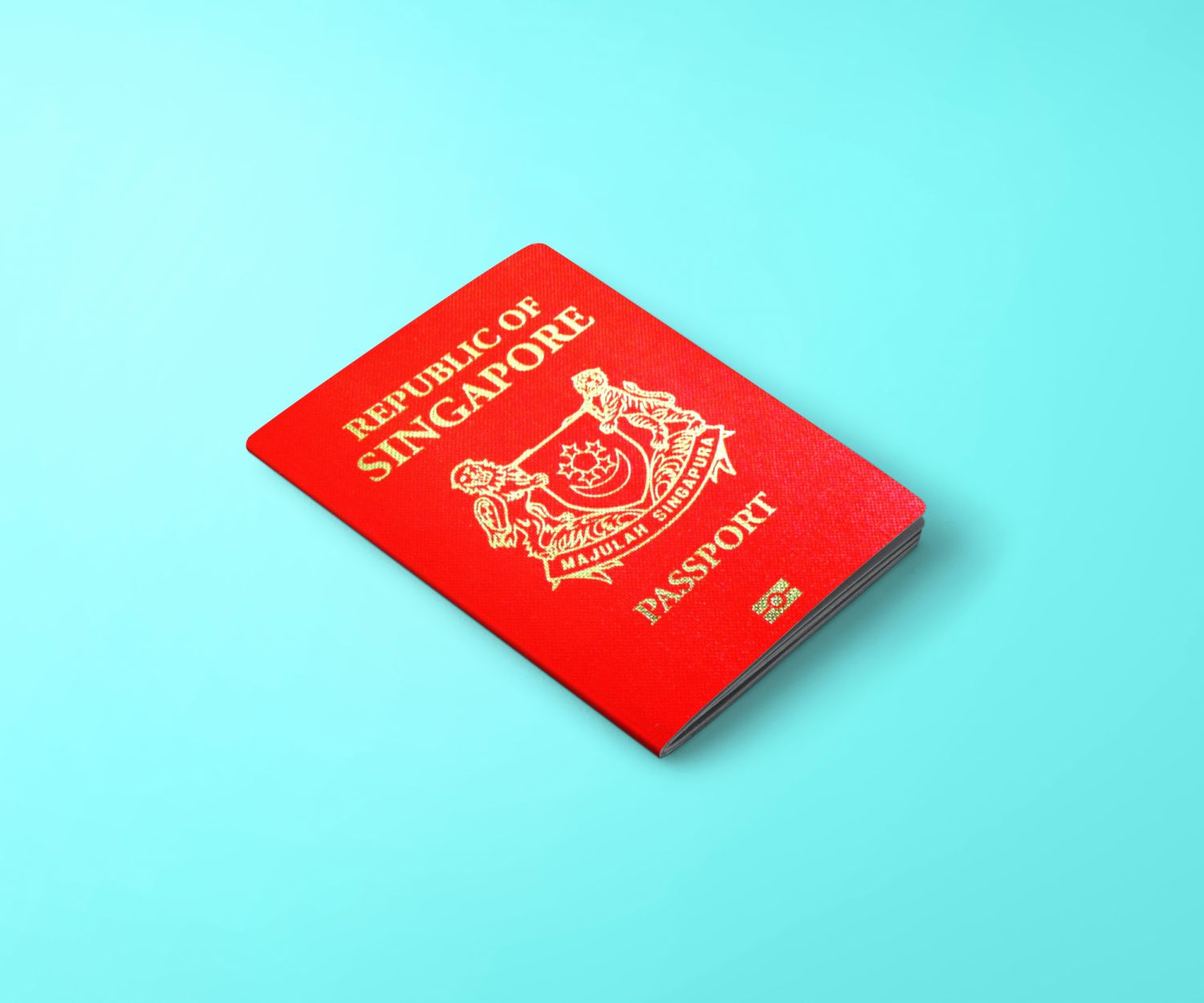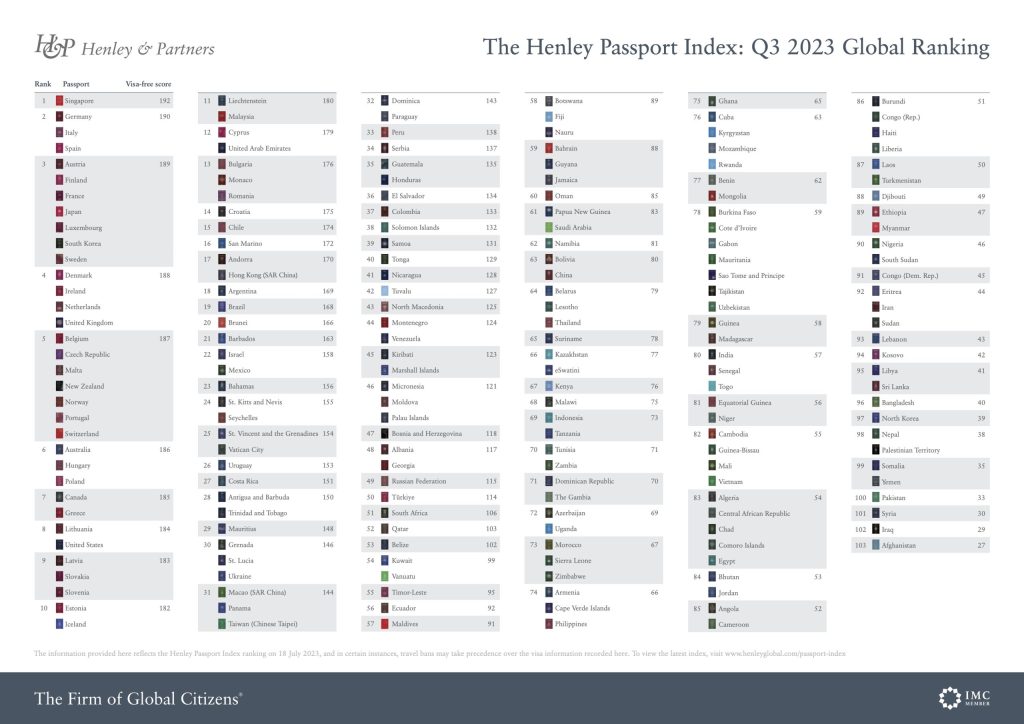Japan has been knocked off the top spot on the Henley Passport Index for the first time in five years and bumped into 3rd place, according to the latest ranking, which is based on exclusive and official data from the International Air Transport Association (IATA). Singapore is now officially the most powerful passport in the world, with its citizens able to visit 192 travel destinations out of 227 around the world visa-free. Germany, Italy, and Spain all move up into 2nd place with visa-free access to 190 destinations, and Japanese passport holders join those of six other nations — Austria, Finland, France, Luxembourg, South Korea, and Sweden — in 3rd place with access to189 destinations without a prior visa.
The UK appears to have finally turned the corner after a six-year decline, jumping up two places on the latest ranking to 4th place — a position it last held in 2017. The US, on the other hand, continues its now decade-long slide down the index, plummeting a further two places to 8th spot with access to just 184 destinations visa-free. Both the UK and the US jointly held 1st place on the index nearly 10 years ago in 2014 but have been on a downward trajectory ever since. Afghanistan remains entrenched at the bottom of the Henley Passport Index, with a visa-free access score of just 27, followed by Iraq (score of 29), and Syria (score of 30) — the three weakest passports in the world.
The general trend over the history of the 18-year-old ranking has been towards greater travel freedom, with the average number of destinations travelers are able to access visa-free nearly doubling from 58 in 2006 to 109 in 2023. However, the global mobility gap between those at the top and bottom of the index is now wider than it has ever been, with top-ranked Singapore able to access 165 more destinations visa-free than Afghanistan.
Dr. Christian H. Kaelin, Chairman of Henley & Partners and the inventor of the passport index concept, says only eight countries worldwide have less visa-free access today than they did a decade ago while others have been more successful in securing greater travel freedom for their citizens. “The UAE has added an impressive 107 destinations to its visa-free score since 2013, resulting in a massive leap of 44 places in the ranking over the past 10 years from 56th to 12th position. This is almost double the next biggest climber, Colombia, which has enjoyed a jump of 28 places in the ranking to sit in 37th spot. Ukraine and China are also among the Top 10 countries with the most improved rankings over the past decade. Far more than just a travel document that defines our freedom of movement, a strong passport also provides significant financial freedoms in terms of international investment and business opportunities. Global connectivity and access have become indispensable features of wealth creation and preservation, and its value will only grow as geopolitical volatility and regional instability increase.”

America’s diminishing passport power
Of the countries sitting in the Top 10, the US has seen the smallest increase in its score on the Henley Passport Index over the past decade, securing visa-free access to just 12 additional destinations between 2013 and 2023. Singapore, by comparison, has increased its score by 25, pushing it five places up the ranking over the past 10 years to number one spot.
Commenting in the Henley Global Mobility Report 2023 Q3, released today alongside the latest index, Greg Lindsay, leading global strategist and urban tech fellow at Cornell Tech’s Jacobs Institute, says that from a purely mechanical perspective, “the story is a simple one — by more or less standing still, the US has fallen behind. While its absolute score has in fact risen over the last decade, the US has been steadily overtaken by rivals such as South Korea, Japan, and Singapore. America’s relentless slide down the rankings — and unlikelihood of reclaiming the highest position any time soon — is a warning to its neighbor Canada and the rest of the Anglosphere as well.”
Former career diplomat with the U.S. Department of State and a senior non-resident associate at the Center for Strategic and International Studies, Annie Pforzheimer, points out that US’s static state of affairs is likely to remain “due to the lack of a demand from inside the US for a change in policy, the extreme political risk for any group or politician who unwittingly facilitates travel by a terrorist, and the fact that tourism has surged post-pandemic anyway, even with a restrictive visa waiver program. Unfortunately, that status quo, over time, may well contribute to a decline in US soft power if businesses struggle to invite partners to trade shows and meetings, tourists encounter needless application delays and look elsewhere, and open xenophobia erodes the public reputation of the US as a world leader.”
Please click the image to zoom in
Exploring the links between visa-free access and openness
Henley & Partners has conducted exclusive new research into the relationship between a country’s openness to foreigners — how many nations it allows to cross its borders visa-free — and its own citizens’ travel freedom, gauged using the Henley Passport Index. The new Henley Openness Index ranks all 199 countries worldwide according to the number of nationalities they permit entry to without a prior visa.
The Top 20 ‘most open’ countries are all small island nations or African states, except for Cambodia. There are 12 completely open countries that offer visa-free or visa-on-arrival entry to all 198 passports in the world (not counting their own), namely: Burundi, Comoro Islands, Djibouti, Guinea-Bissau, Maldives, Micronesia, Mozambique, Rwanda, Samoa, Seychelles, Timor-Leste, and Tuvalu. At the bottom of the Henley Openness Index, four countries score zero, permitting no visa-free access for any passport: namely, Afghanistan, North Korea, Papua New Guinea, and Turkmenistan. They are followed by five countries that provide visa-free access to fewer than five other nationalities: namely, Libya, Bhutan, Eritrea, Equatorial Guinea, and India.
Leading sociologist at Tel Aviv University, Prof. Dr. Yossi Harpaz, says the data clearly shows that the relationship between travel freedom (Henley Passport Index score) and openness (Henley Openness Index score) is not straightforward but manifests in a complex, non-linear manner. “Nations’ diplomatic and socio-economic realities and strategic goals significantly impact these factors, resulting in a complex web of interrelations. As the global landscape continues to change, so will these patterns, reflecting the dynamic nature of global mobility.”
Lindsay goes on to explain that while the correlation between a high openness score and high visa-free access score is less evident in the data, “it is notable that Singapore and South Korea — high climbers on the Henley Passport Index over last decade, moving up from 6th and 7th respectively in 2013 to 1st and 3rd today — boast relatively high degrees of openness, while the US and Canada have slid down the Top 10 rankings as their openness stagnates.”
Unwelcoming developed economies
While American passport holders can access 184 (out of 227) destinations visa-free, the US itself only allows 44 other nationalities to pass through its borders visa-free, putting it way down the Henley Openness Index in 78th place (compared to 8th place on the Henley Passport Index). When comparing the two rankings, the USA’s disparity in access versus its openness is the second biggest, narrowly trailing only Australia (and barely outpacing Canada). New Zealand and Japan also make it into the Top 5 countries with the biggest difference between the travel freedom they enjoy versus the visa-free access they provide to other nationalities. It is interesting to note that these five nations have all either dropped down the Henley Passport Index rankings or remained in the same place over the last ten years.
Commenting in the Henley Global Mobility Report 2023 Q3, Prof. Peter J. Spiro, who holds the Charles Weiner Chair in international law at Temple University, says America’s extension of visa-free access is low, even by the standard of developed economies. “EU states grant visa-free privileges to more than twice the number of states than does the US, for example. For those not enjoying visa exemptions, there are qualitative aspects of the visa system that are impacting US competitiveness in the global system. Processing delays, high refusal rates, and a reputation for disagreeable customer service are tarnishing the attractiveness of the US as a destination for those for whom visas are required. For example, prospective international students are increasingly drawn to competitor institutions in Canada, the UK, and the EU over their US counterparts. Add to that the growing reputation of the US as ridden with gun violence and one can project a long-term trajectory in which US global standing further erodes.”
The Top 5 countries with the biggest (negative) difference between their own visa-free access and their openness to other nations are Somalia, Sri Lanka, Djibouti, Burundi, and Nepal, and the Top 5 with the smallest discrepancy between their access and their openness are Singapore, South Korea, Malaysia, Hong Kong (SAR China), and Barbados.
Gulf Cooperation Council (GCC) countries have generally displayed higher-than-average shifts towards increased openness, in particular, the UAE’s openness score increased from 58 to 80 since 2018 (22 points) and Oman’s leapt from 71 to 106 (35 points) over the same period. But as Dr. Robert Mogielnicki, a Senior Resident Scholar at the Arab Gulf States Institute in Washington, points out, only the UAE has enjoyed a significant increase in its own travel freedom. “Regional governments can impact the supply-side of the development equation by adjusting visa schemes, enacting reforms, and launching new initiatives. However, a greater supply of such offerings does not necessarily guarantee reciprocity or an immediate boost in global demand from individuals and firms. A Schengen-style visa to facilitate smoother travel between GCC countries is reportedly in the works. Such a step would require greater harmonization of region-wide visa regulations, potentially boosting the openness rankings of several GCC countries and placing the entire region more firmly in the global spotlight.”
We would like to thank Henley & Partners for sponsoring this post.












